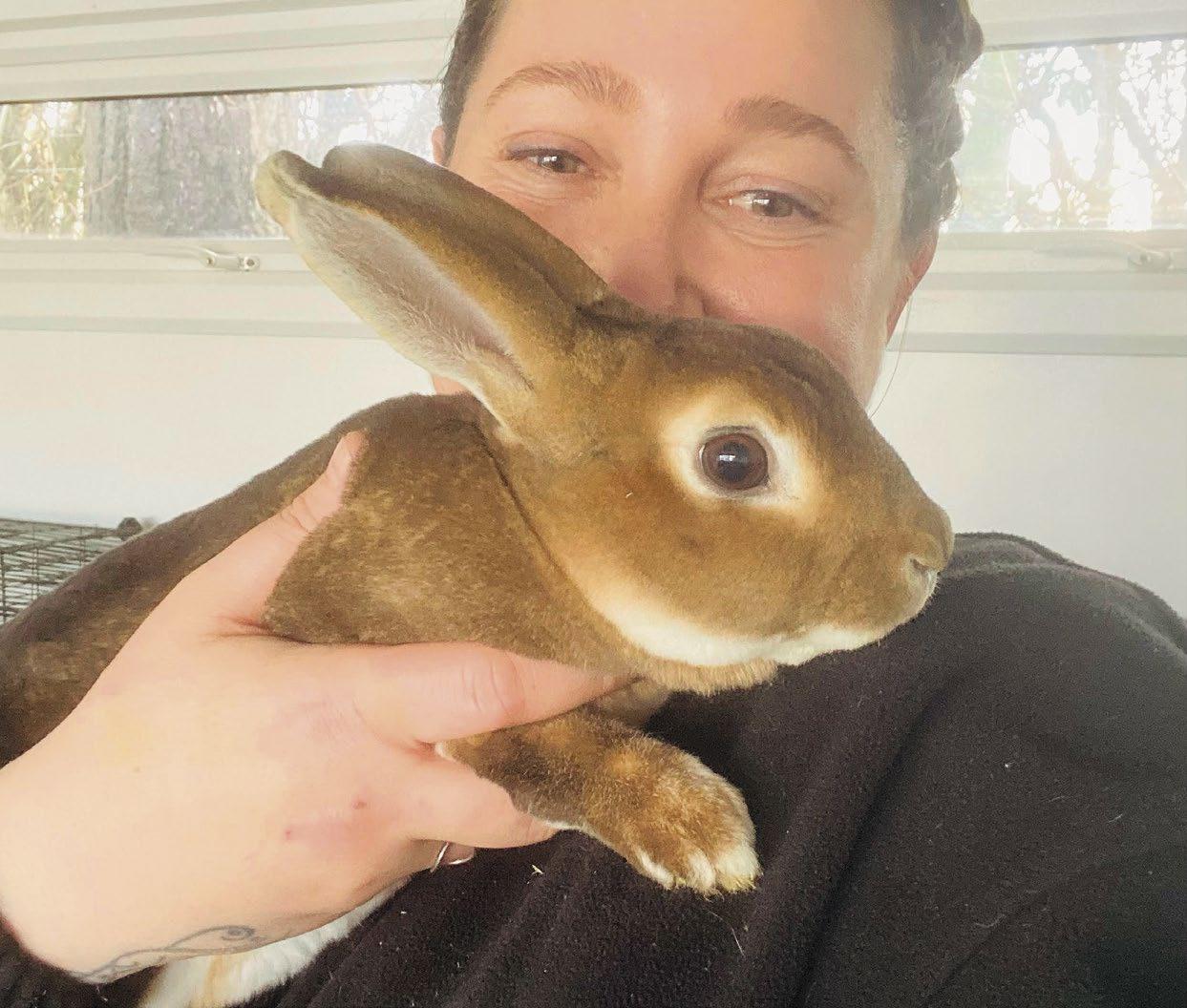
8 minute read
ANIMALS IN NEED
Zoe with one of the rabbits in her care
Caring with a hop, a skip and a binky!
Animals in Need (AIN) volunteer Zoe Plummer tells Pulse's Sammy Jones about the beauty of bunnies, and why you should think before you give one a home.
With their wiggly, twitchy noses, their powder puff tails and those lovely long ears, bunnies are undoubtedly pretty little things. And they are often the preferred choice for a first pet.
The kids will love them and they'll be easy to look after, won't they?
And therein lies the problem – it simply isn't true to think of them as low-maintenance pets simply because they don't need to be taken out on a lead twice a day.
“Rabbits are not an 'easy' pet for a child,” says Zoe, “They have a nervous nature, so building a relationship of trust takes a lot of patience. Rabbits, like all all pets, have specific needs for housing, cleaning, handling, and food, and you need to create interesting and stimulating activities for them to do. Rabbits need companionship as much as food, so you should have at least a pair of rabbits.”
Unfortunately, as rabbits aren't as interactive as our feline and canine friends, attentions wane in youngsters, the bunny grows up and parents are left to feed 'the thing in the hutch' in the garden.

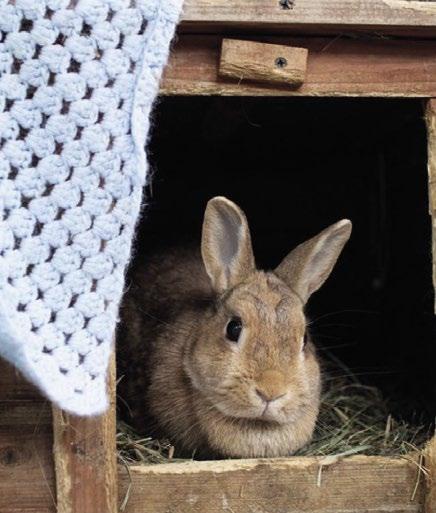
Imagine being that little bunny – confined, lonely and largely forgotten.
Some families who realise their mistake do the right thing and take them to their nearest animal charity – which is where Animals in Need steps in.
“We currently have 31 beautiful characters seeking their forever homes,” Zoe told me, but that small number contributes to a colossal nationwide figure, with around 67,000 rabbits being given up to rescue centres annually in this country.
The average length of stay for a rabbit in a rescue centre is a year.
“The most common reason we hear when people bring them to us is 'The rabbit isn't getting the time and care they should.' Sometimes, people discover they have an allergy to hay or to rabbit fur, and housing situations can also result in families needing to surrender the rabbits.”
While AIN is there to support animals and assist owners in times of need, they would far rather people thought long and hard before deciding to give a rabbit, or indeed any animal, a home, because when things break down and go wrong, these beautiful little creatures suffer terribly.
In November, a large grey rabbit was handed in to a veterinary practice in Northampton. He hadn't been microchipped and so there was no way of contacting an owner. If there even was one.
Staff called him Fred and he was handed to AIN. He was broken.
“His skin was covered in sores, he had fur missing from around his eyes which were so infected they were raw and bleeding, he was very underweight and his nails and teeth were overgrown.
“He just sat in the corner of his house and didn’t move, he had completely lost his spirit,” Zoe remembers.
Quite how Fred had ended up in such a horrendous state doesn't bear thinking about, but thanks to the persistence and gentle support of AIN's volunteers and daily medication for several weeks, this fragile little fella is learning to live again; he is now grooming himself, his eyes and skin are showing signs of improvement and he is loving his food. He has even started to play – it's a world away from the creature who arrived late last year.
Zoe said: “When we go in to see him, he will now come forward for attention too – it's wonderful to see the change and we hope Fred can be put up for adoption next month.”
And adoption is always the way to go – every time you 'shop' instead of 'adopt' you are adding to the problem of unwanted bunnies. And with 45 million rabbits in the UK, their numbers need no help to grow.
“When you adopt a rabbit, you give them a second chance. Adopting a bonded pair or trio is ideal if you work full time because the rabbits can entertain each other.”
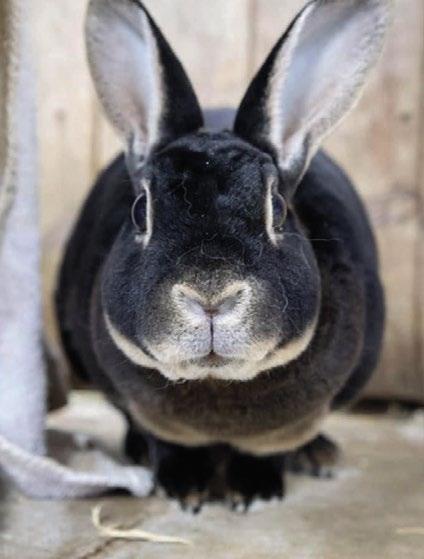
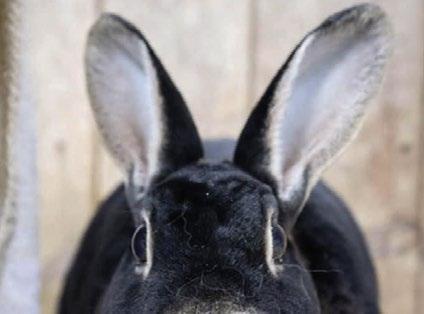
And the reasons to adopt are plentiful: “Adopting from a rescue means the staff can talk with you about the rabbits’ personality helping you find the right fit for your family. You will be supporting and promoting positive animal welfare which makes you a good human.”
And let's talk a little about the positives of giving Bugs a home – there are lots of those too.
“They will make you smile when you are down, will listen when you need to talk and they will sit with you when you need a friend. Rabbits are the most playful in the morning and evenings so they are the perfect start and end to your day. Rabbits are intelligent, they can learn tricks and play games and they are just adorable to look at, so what is not to love? Bunnies can be sweet, friendly, sassy, energetic, balls of love with plenty of character.
“They are quiet too, so they will never bother a neighbour or wake you in the night.”
Donating time to Animals in Need is far from a one-way street – it helps the volunteers every bit as much as the animals, and Zoe is a perfect case in point.
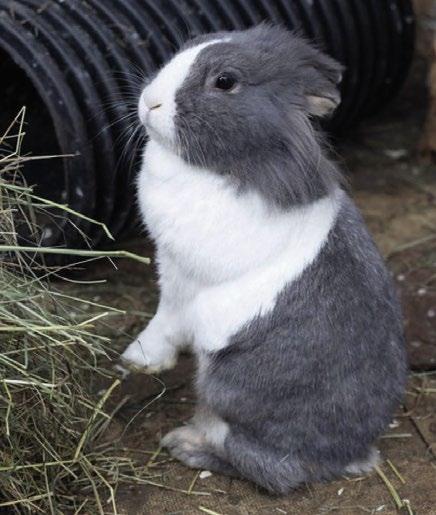
Beautiful but fragile: Think before you introduce a rabbit to your household - and adopt, don't shop
Shortly before the first lockdown, Zoe gave up her position teaching photography to work freelance. Her business was an early casualty of the pandemic and closed within two months.
To make ends meet, she took on freelance work as a dog walker, until a freak accident shattered her hip socket and rendered her largely immobile. Six months later she was still struggling to return to pre-accident levels of mobility.
“My mental health was hugely impacted whilst healing from this life-defining event and together with the impact of COVID on social interaction life was not feeling great,” she admits.
And then she came across an advert for volunteers and staff at the centre, and things got brighter.
“Animals In Need has been amazing for my physical recovery and for my mental health,” she said, “The animals and my fantastic colleagues have been a lifeline in my recovery. I smile and laugh every day at work and have real value in what I do.”
As tends to be the case with those who give their time at AIN, Zoe also has a minimenagerie of animals at home, and when the
FEATURE Things to consider before giving a bunny a home
Rabbits are social and curious animals and make fantastic pets. Healthy, well cared-for rabbits can live between seven and 10 years – the same life span as some dogs, and they require the same level of love and commitment.
How much will it cost?
Adopting is cost effective. At Animals In Need, the rabbit adoption fee of £60 also includes four weeks free insurance, vaccinations, spay/neuter, microchipping, flea control, dental care, nail trimming and behavioural training (if necessary). They also offer rabbit aftercare advice and bonding services.
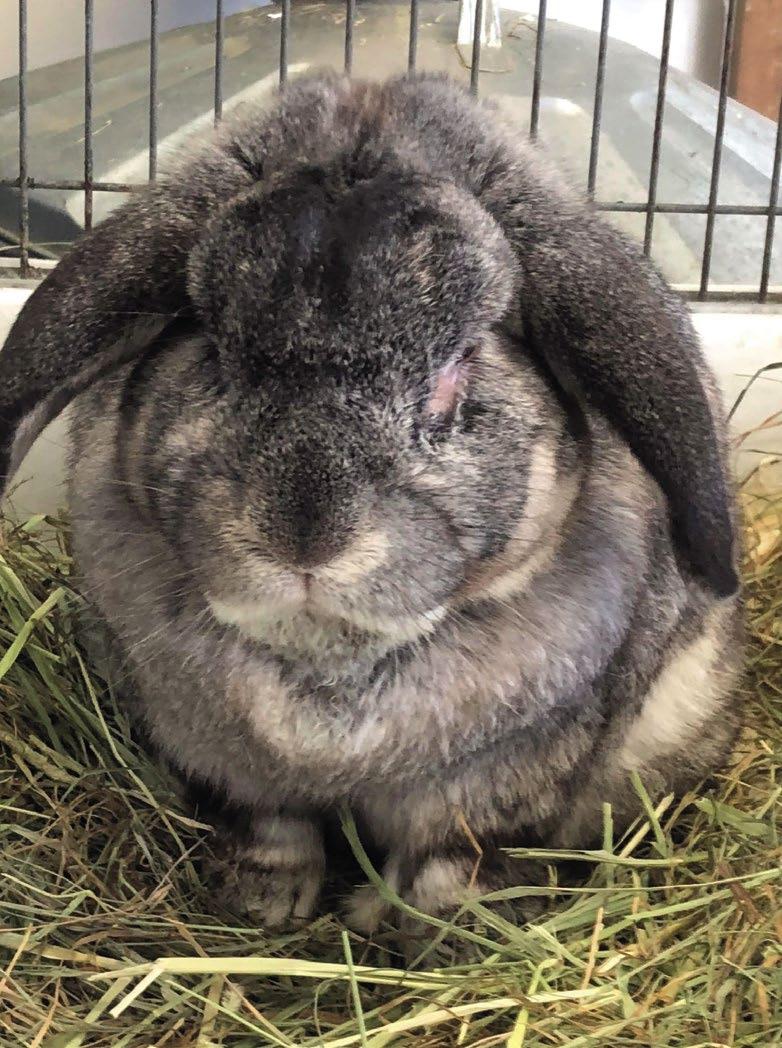
Beautiful boy Fred is in recovery and receiving lots of love at AIN
need is there, she will foster those who are Not that you'll be able to adopt as Easter brought into the Little Irchester site. nears; the welfare of every animal in its
“My family includes dogs, cats, reptiles, care is paramount, and Animals in Need fish and guinea pigs,” she admits, therefore refuses to re-home at this “Rabbits behave and 'seasonal' time. communicate in a very It does of course welcome different way to guinea applications for adoption pigs, so they do not before and after Easter. understand each And anyone thinking other's behaviour of purchasing a and therefore do cutesy fluff bundle not make ideal needs to heed companions. the advice given
“I love caring by Zoe. for the rabbits “Please at Animals In remember these Need and I intelligent gentle foster animals as animals will not give needed. It is very instant gratification hard to let them go like a cuddly toy or but I know there are piece of chocolate,” good people out there she urges, “The Easter ready to give a second bunny and Easter eggs chance and a loving home.” originated as pagan symbols
It's no coincidence that we are of spring and rebirth. If you want to running this feature in the lead up to focus on a new beginning, or having a pet Easter, a time when rabbits feature on that helps the environment as well as bringing imagery in the same way that robins adorn love and commitment into your family then Christmas cards. please adopt.”
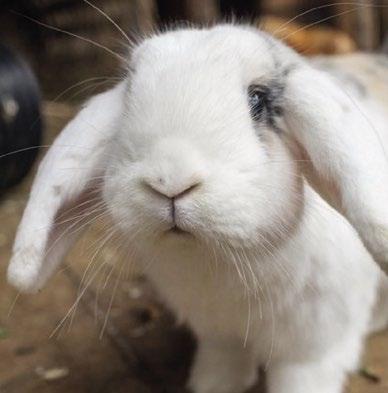
Bunnies can make great pets - but always rehome a pair
What will my pet need?
They need companionship and stimulation in their home, space to exercise and somewhere cosy to sleep. A healthy diet will help prevent dental and gut disease; rabbits should eat hay, nuggets and greens and have constant access to fresh water. You should check that your rabbits eat daily and create plenty of dry droppings. Their front teeth and nails should be checked weekly. Only vets should correct overgrown teeth. They need shelter from weather and safety from predators. Annual vaccinations and vet checks are important. Groom your rabbit regularly and give treatment for fleas and worms.
Should we get our bunnies neutered?
Yes, please do. Un-neutered females are at risk of developing womb cancer and un-neutered male rabbits are likely to fight.
Did you know?
Rabbits are eco-friendly and their poo is one of the most efficient natural manures on the planet! If you use a natural litter it is possible to compost their entire litter box, and you can grow herbs and greens!
> For more details on Animals in Need, to find out how you can help, or if you are interested in adopting an animal, please visit animals-in-need.org










